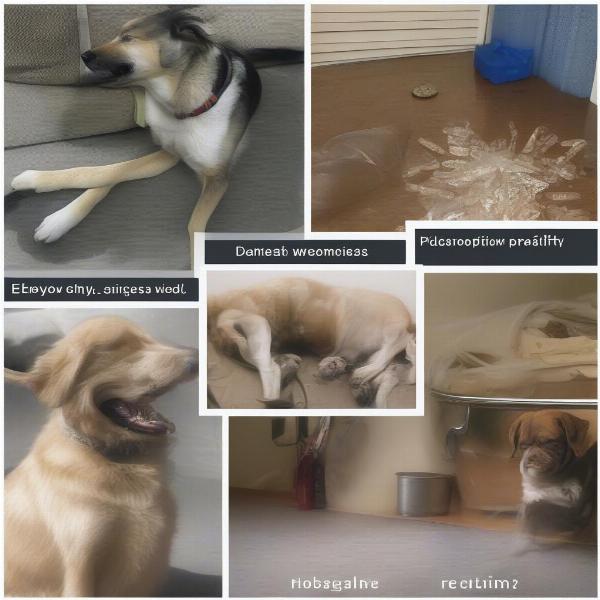The phrase “mad dogs and alcohol” might conjure images of rabid canines stumbling around in a drunken stupor. However, the reality is far more serious. While the term itself might be used colloquially, the connection between dogs and alcohol consumption highlights a crucial aspect of pet ownership: alcohol is toxic to dogs. This article will explore the dangers of alcohol for dogs, explaining why even small amounts can be harmful and what to do if your dog accidentally ingests alcohol.
Alcohol affects dogs much more rapidly and severely than humans due to their smaller size and differing metabolism. Even a small amount of beer, wine, or liquor can cause alcohol poisoning in dogs. Symptoms can range from vomiting and diarrhea to incoordination, tremors, and even respiratory failure in severe cases. The type of alcoholic beverage doesn’t matter; all contain ethanol, the toxic component for dogs.
Why Alcohol is Poisonous to Dogs
A dog’s liver isn’t equipped to process alcohol efficiently. Ethanol is metabolized into acetaldehyde, a highly toxic substance that can cause significant damage to a dog’s organs. This process happens much faster in dogs than humans, leading to a rapid buildup of acetaldehyde in their system.
 Alcohol Poisoning Symptoms in Dogs
Alcohol Poisoning Symptoms in Dogs
What to Do If Your Dog Drinks Alcohol
If you suspect your dog has ingested alcohol, immediate veterinary attention is crucial. Time is of the essence. Do not wait for symptoms to appear. Contact your veterinarian or an emergency animal hospital immediately. Be prepared to provide information about the type and amount of alcohol consumed, as well as your dog’s size and breed. The veterinarian may induce vomiting or administer fluids to help flush the alcohol from your dog’s system.
Preventing Alcohol Exposure in Dogs
Prevention is always the best approach. Keep all alcoholic beverages out of your dog’s reach. This includes unattended drinks, spills, and even bottles stored in seemingly inaccessible locations. Educate your family and guests about the dangers of alcohol for dogs and ensure they understand the importance of keeping drinks away from your furry friend. Be particularly vigilant during parties and social gatherings where alcohol is readily available.
Can Dogs Have Non-Alcoholic Beer?
Even non-alcoholic beer can contain trace amounts of alcohol, which can still be harmful to dogs. It’s best to avoid giving your dog any type of beer, even if it’s labeled as non-alcoholic. Instead, offer fresh water or dog-friendly beverages specifically formulated for their needs.
Signs of Alcohol Poisoning in Dogs
Recognizing the signs of alcohol poisoning is crucial for prompt action. These signs can include:
- Vomiting
- Diarrhea
- Loss of coordination
- Weakness
- Tremors
- Seizures
- Difficulty breathing
- Decreased body temperature
- Coma
Conclusion: Keeping Your Canine Companion Safe
Alcohol and dogs are a dangerous mix. Never allow your dog to consume alcohol, even in small amounts. By understanding the risks and taking preventative measures, you can ensure your furry friend’s health and safety. Remember, if you suspect your dog has ingested alcohol, contact your veterinarian immediately. Swift action can be life-saving.
FAQ
- What should I do if my dog licks a small amount of spilled beer? Even small amounts can be harmful. Contact your veterinarian immediately for advice.
- Are certain breeds of dogs more susceptible to alcohol poisoning? Smaller dogs are generally more susceptible due to their size, but all breeds are at risk.
- Can alcohol cause long-term damage to a dog? Yes, alcohol poisoning can cause liver and kidney damage, neurological problems, and even death.
- Is there an antidote for alcohol poisoning in dogs? There is no specific antidote, but supportive care, such as IV fluids and monitoring, can be crucial.
- How long does it take for alcohol poisoning symptoms to appear in dogs? Symptoms can appear within 30 minutes to several hours, depending on the amount ingested and the dog’s size.
- Can dogs eat food cooked with alcohol? Even cooked food containing alcohol can be harmful to dogs. It’s best to avoid feeding them any food containing alcohol.
- Is hand sanitizer dangerous for dogs? Yes, hand sanitizer contains high concentrations of alcohol and can be very dangerous if ingested by dogs.
dog daycare vail
dog daycare thousand oaks ca
dog kennels janesville wi
dog kennels gulf shores al
ILM Dog is your trusted international resource for expert dog care advice, covering everything from breed selection and health to training, nutrition, and grooming. We are committed to providing practical, reliable information to dog owners worldwide. Whether you’re a new pet parent or a seasoned dog lover, we offer valuable insights and guidance to help you navigate every aspect of dog ownership. For expert advice on dog breeds, health, training, nutrition, and grooming, contact us at [email protected] or +44 20-3965-8624. Visit ILM Dog for more information and connect with a community of passionate dog owners.